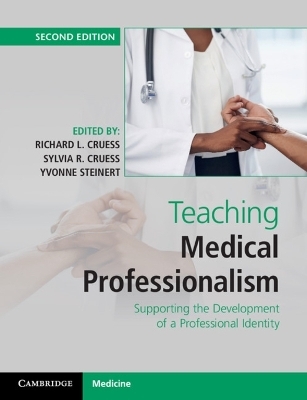
Teaching Medical Professionalism
Cambridge University Press (Verlag)
978-1-107-49524-1 (ISBN)
This book presents ideas, evidence and guidance for those interested in using the most recent advances in knowledge about learning and human development to enhance medical education's ability to form competent, caring and publicly responsible physicians. It does this by establishing the development of a professional identity in medical students and residents as a primary goal of medical education. This new approach is emerging from experience and experiment by medical educators articulating a new way of understanding their mission. It is an optimistic book - the voices are those of the leaders, theorists and experienced practitioners who have found in this new approach a promising way to confront the challenges of a new era in medicine. It summarizes the theoretical basis of identity formation, outlines our current knowledge of how best to assist learners as they acquire a professional identity, and addresses the issue of assessment of progress towards this goal.
Richard L. Cruess, M.D., is an orthopedic surgeon and former Dean of Medicine at McGill University, Montréal. Sylvia R. Cruess, M.D., is an endocrinologist at McGill University and former Medical Director of the Royal Victoria Hospital in Montréal. Twenty years ago, following distinguished careers in these respective fields, Sylvia Cruess and her husband, Dr Richard Cruess, began working together on issues related to professionalism and medicine. They have developed a definition of profession for medical educators, have developed and published methods of teaching professionalism, and have created methods of assessing professionalism in students, residents, and faculty members. In all of their work, they have emphasized the importance of medicine's social contract with society. Recently they, along with others, have come to believe that the teaching of professionalism should not be regarded as an educational goal in itself. Rather, teaching professionalism is a means to an end, with the end being to ensure that all individuals entering the practice of medicine have acquired a professional identity so that they come to think act, and feel like physicians. Their recent work has focused on the nature of a medical professional identity and how best to support learners as they acquire this identity. This work has been done in collaboration with Yvonne Steinert. Yvonne Steinert, Ph.D., is a clinical psychologist who began her career in Family Medicine in the field of faculty development. She is recognized as being one of the pioneers in the field and remains one of its foremost leaders. She has served as Associate Dean for Faculty Development at McGill University, Montréal, and is presently the Director of the Centre for Medical Education and the holder of the Richard and Sylvia Cruess Chair in Medical Education at McGill University. She has published extensively in many areas of medical education and is the editor of the pre-eminent book on Faculty Development in the Health Professions: A Focus on Research and Practice. She has also been responsible, together with Richard and Sylvia Cruess and other colleagues at McGill University, for developing the theoretical underpinnings and implementation strategies for programs on teaching medical professionalism. With her colleagues, she is responsible for the change in focus from teaching professionalism to supporting learners as they acquire their own professional identities.
Introduction Richard L. Cruess, Sylvia R. Cruess and Yvonne Steinert; Part I. What Is to Be Taught and Learned: 1. Professionalism and professional identity formation: the cognitive base Richard L. Cruess and Sylvia R. Cruess; 2. Developing a professional identity - a learner's perspective Robert Sternszus; Part II. Theory: 3. Theoretical insights into the nature and nurture of professional identities Lynn V. Monrouxe; 4. Socialization, professionalism and professional identity formation Frederic William Hafferty; 5. Educational theory and strategies to support professionalism and professional identity formation Yvonne Steinert; 6. Role modelling and mentoring in the formation of professional identity Karen V. Mann and Elizabeth Gaufberg; 7. Experiential learning and reflection to support professionalism and professional identity formation Thomas A. Hutchinson and Mark Smilovitch; Part III. Principles: 8. General principles for establishing programs to support professionalism and professional identity formation at the undergraduate and postgraduate levels Sylvia R. Cruess and Richard L. Cruess; 9. Faculty development to support professionalism and professional identity formation Yvonne Steinert; 10. Becoming interprofessional: professional identity formation in the health professions Jill E. Thistlethwaite, Koshila Kumar and Christopher Roberts; 11. Assessment of professionalism and progress in the development of a professional identity John Norcini and Judy Shea; 12. Remediation of unprofessional behavior Louise Arnold, Christine Sullivan and Jennifer Quaintance; 13. Professional identity formation, the practicing physician and continuing professional development Jocelyn Locker, Ivan Silver and Janet de Groot; 14. Professionalism, professional identity, and licensing and accrediting bodies Donald Irvine; Part IV. Case Studies in Promoting Professionalism and Professional Identity Formation across the Continuum: 15. The evolution of an undergraduate medical program on professionalism and identity formation J. Donald Boudreau; 16. Developing and implementing an undergraduate curriculum based on professional identity formation Mark D. Holden, Era Buck and John Luk; 17. Supporting professionalism and professional identity formation at the postgraduate level Linda Snell; 18. Changing the educational environment to better support professionalism and professional identity formation Mark J. DiCorcia and Lee A. Learman; Part V. The Future: 19. Professional identities of the future: invisible and unconscious or deliberate and reflexive? Brian D. Hodges.
| Erscheinungsdatum | 01.04.2016 |
|---|---|
| Zusatzinfo | 12 Tables, black and white; 2 Halftones, unspecified; 21 Line drawings, unspecified |
| Verlagsort | Cambridge |
| Sprache | englisch |
| Maße | 190 x 247 mm |
| Gewicht | 700 g |
| Themenwelt | Medizin / Pharmazie ► Medizinische Fachgebiete ► Medizinethik |
| Studium ► Querschnittsbereiche ► Geschichte / Ethik der Medizin | |
| ISBN-10 | 1-107-49524-5 / 1107495245 |
| ISBN-13 | 978-1-107-49524-1 / 9781107495241 |
| Zustand | Neuware |
| Haben Sie eine Frage zum Produkt? |
aus dem Bereich


